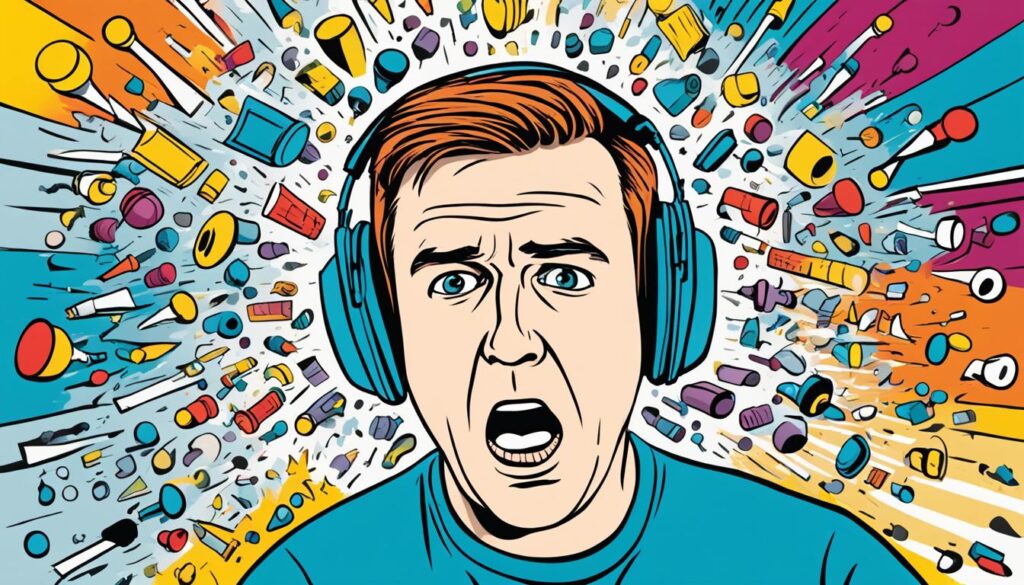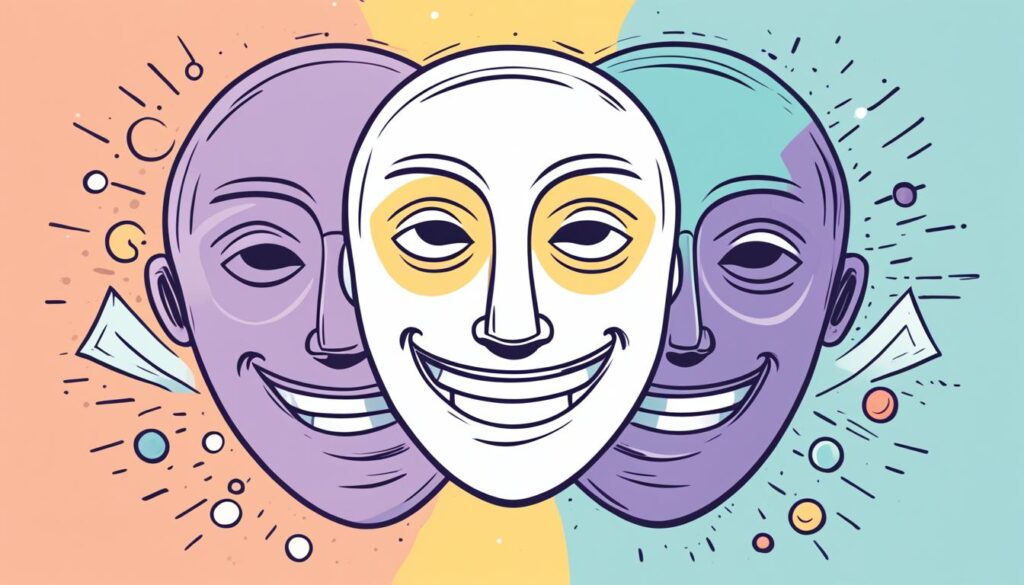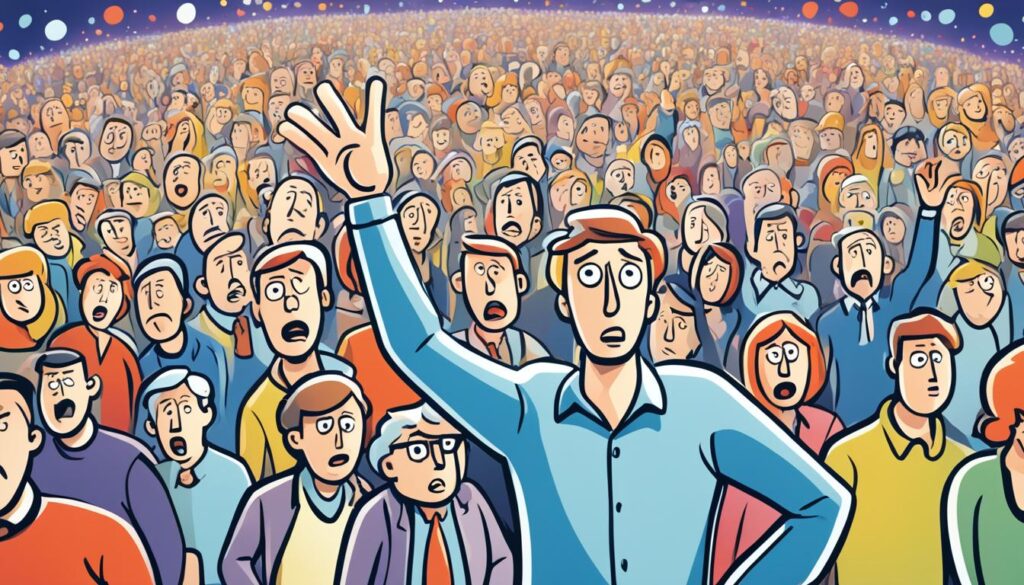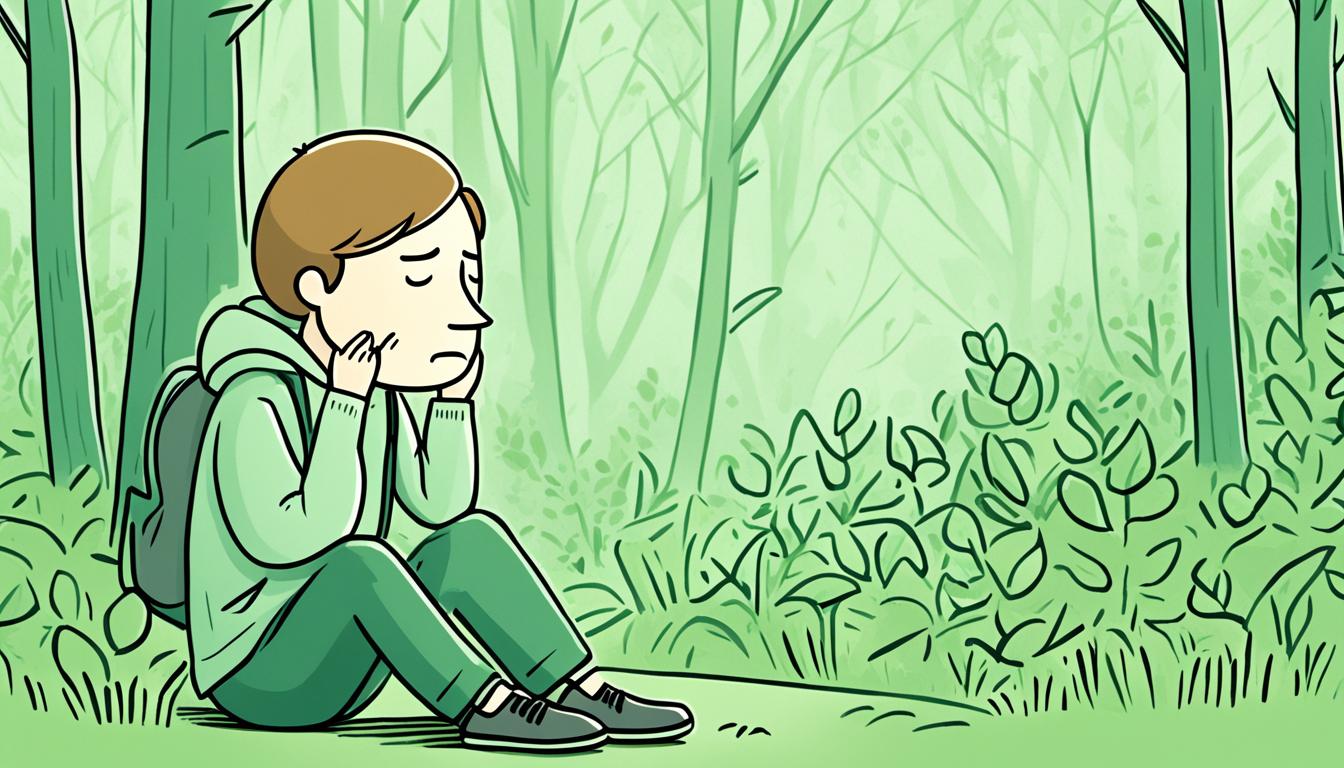Have you ever wondered why introverts often feel drained after socializing? Despite having their unique strengths and qualities, introverts can experience a decrease in energy levels and a sense of exhaustion after engaging in social activities. But what exactly causes this drain? Is it simply a matter of introversion, or are there deeper reasons behind it?
In this article, we delve into the world of introverts and explore the reasons behind their drain after socializing. From the challenges of overstimulation to the impact of emotional labor, we uncover the factors that contribute to introvert burnout and social fatigue. By understanding these reasons, we can gain insights into how introverts can better manage their energy levels and maintain their well-being.
So, let’s dive in and unravel the mystery of why introverts get drained!
Key Takeaways:
- Introverts experience a decrease in energy levels after socializing due to various factors.
- Social interactions require introverts to adapt and engage in extroverted behavior, which can be mentally and emotionally taxing.
- Introverts have a lower tolerance for high levels of external stimulation, such as noise and crowds, leading to overstimulation and exhaustion.
- The concept of a “social battery” highlights the limited capacity introverts have for social interactions, necessitating sufficient alone time to recharge.
- Overthinking social interactions, maintaining an extroverted facade, and discomfort in crowds are among the many reasons introverts feel drained after socializing.
The Introvert’s Social Battery
As an introvert, you have a unique energy system known as the “social battery.” Just like a battery that powers our devices, your social battery determines your energy levels during social interactions.
When you engage in social activities or spend prolonged periods socializing, your social battery gradually depletes. This depletion can lead to an introvert hangover, characterized by feelings of exhaustion, irritability, and the strong need for alone time to recharge.
Recharging your social battery is essential for introverts to restore their energy levels and maintain their mental and emotional well-being. Alone time is the key to replenishing your energy. Whether it’s a quiet evening at home with a good book or a solo nature walk, finding time for solitude allows you to recharge and regain your vitality.
| Ways to Recharge Your Social Battery |
|---|
| 1. Spend time alone in a peaceful environment |
| 2. Engage in activities that bring you joy and relaxation |
| 3. Practice self-reflection and introspection |
| 4. Pursue hobbies or creative outlets |
| 5. Take breaks during social events to recharge |
By embracing and honoring your need for alone time, you can effectively manage your social battery, prevent introvert burnout, and ensure you have the energy to engage in social interactions when you choose to do so.
The Noise Bombardment
Noise bombardment can have a significant impact on introverts, who are more sensitive to external stimuli. Constant exposure to loud environments and excessive noise can result in sensory overload and exhaustion. The sensory overload experienced by introverts is caused by an overwhelming amount of stimulation, including noise, which can lead to mental fatigue and physical symptoms such as headaches.
When introverts are subjected to high levels of noise for extended periods, it can activate their nervous system, increasing stress levels and further contributing to mental fatigue. The constant bombardment of noise can disrupt their ability to concentrate and can even interfere with their sleep patterns. These effects highlight the need for introverts to seek quieter environments and limit exposure to excessive noise in order to better manage their energy levels and overall well-being.

The image above visualizes the concept of sensory overload, representing the feeling of being overwhelmed by excessive external stimuli, including noise. It serves as a reminder of the challenges introverts face in noisy environments and the importance of finding solace in quieter spaces.
| Noise Bombardment Effects | Introvert Coping Mechanisms |
|---|---|
|
|
Overthinking Every Interaction
One common characteristic of introverts is their tendency to overthink social interactions. After engaging in a conversation or social event, introverts often find themselves replaying the conversation in their minds and analyzing every detail. This tendency can be mentally draining and contribute to the feeling of being drained after socializing.
The introvert’s mindset, characterized by a higher level of self-awareness and self-reflection, makes them more prone to overthinking their social interactions. Introverts often anticipate negative outcomes and scrutinize their own words and actions, leading to a heightened level of self-criticism and analysis.
Overthinking can also lead to social anxiety in introverts. The constant evaluation of one’s social performance and the fear of judgment from others can intensify the mental and emotional strain experienced after socializing.
Practicing mindfulness can be a beneficial strategy for introverts to manage overthinking tendencies and reduce social anxiety. By cultivating present-moment awareness and non-judgmental acceptance of their thoughts and emotions, introverts can gain a sense of mental clarity and calmness. Mindfulness techniques, such as deep breathing exercises or meditation, can help introverts redirect their focus away from overthinking and promote a more relaxed state of mind during and after social interactions.
In summary, overthinking is a common trait among introverts that contributes to their feeling of being drained after socializing. By understanding their tendency to overanalyze and practicing mindfulness, introverts can manage their overthinking tendencies and reduce social anxiety, ultimately preserving their mental and emotional well-being.
| Overthinking Every Interaction – Common Characteristics | Impact on Introverts |
|---|---|
| Replaying conversations and analyzing every detail | Mental drain and increased self-criticism |
| Anticipation of negative outcomes | Heightened social anxiety and emotional strain |
| Practicing mindfulness | Managing overthinking tendencies and reducing social anxiety |
The Mask of Extroversion
Introverts often find themselves in situations where they feel the need to put on a “mask of extroversion” to fit in or meet societal expectations. This social persona requires significant emotional labor and energy expenditure. Introverts must adapt their behavior and adopt a more extroverted persona, even if it goes against their natural inclination.
Maintaining an extroverted facade can be draining for introverts as they may feel inauthentic and disconnected from their true selves. They have to constantly suppress their introverted tendencies and conform to societal norms, which can lead to a sense of dissonance and emotional exhaustion.

By wearing this mask of extroversion, introverts may find themselves expending a considerable amount of energy during social interactions. They have to continuously monitor and regulate their behavior, emotions, and reactions to conform to the expectations of others.
This emotional labor adds an extra layer of complexity and overexerts the introvert’s energy reserves. Consequently, after social interactions, introverts often experience a feeling of being drained. The energy they put into maintaining a social persona comes at the expense of their own well-being.
| Challenges | Effects |
|---|---|
| Constantly suppressing introverted tendencies | Feeling drained and disconnected from one’s authentic self |
| Expending energy and emotional labor | Increased exhaustion and emotional dissonance |
- Introverts may find it challenging to balance their true selves with the social persona they project.
- The need to maintain an extroverted facade can contribute to emotional exhaustion and the feeling of being drained.
- Authenticity can be compromised, leading to a sense of disconnection from oneself and others.
It is crucial for introverts to find ways to recharge and regain their energy after engaging in social situations that require the mask of extroversion. Honoring their authentic selves and seeking opportunities for solitude and self-reflection can help introverts restore their energy levels and maintain their mental well-being.
Sensory Overload
One of the challenges introverts face in social situations is sensory overload. When exposed to excessive stimulation, introverts can feel overwhelmed and drained. They tend to have heightened sensitivity to various stimuli, including strong smells, bright lights, and crowded environments.
Thankfully, introverts have developed various coping mechanisms to manage sensory overload and recharge their energy levels. One popular method is to retreat to a quiet and peaceful environment. By finding a calming space, introverts can minimize external stimuli and give their senses a much-needed break.
Another effective strategy is to spend time in nature. Surrounded by the beauty and tranquility of the natural world, introverts can find solace and rejuvenation. Whether it’s a quiet hike through the woods, a stroll along the beach, or simply sitting by a peaceful lake, nature offers a soothing haven for introverts.
Practicing meditation is also beneficial for introverts. By engaging in mindful breathing and focusing their attention inward, introverts can cultivate a sense of calm and relaxation. This allows them to process their emotions and recharge their energy in a peaceful and introspective way.
Lastly, introverts greatly value solitude as a means of recharging. Spending time alone provides them with the opportunity for self-reflection and introspection. Introverts may engage in activities such as reading, pursuing hobbies, journaling, or simply enjoying quiet moments of solitude to replenish their energy and find inner peace.
| Coping Mechanisms | Description |
|---|---|
| Retreat to a quiet space | Finding a calm and peaceful environment free from excessive stimulation |
| Spending time in nature | Seeking solace in the beauty and tranquility of natural surroundings |
| Practicing meditation | Cultivating calm and relaxation through mindful breathing and introspection |
| Solitude | Engaging in activities that promote self-reflection and introspection |
By employing these introverted coping mechanisms, introverts can effectively manage sensory overload, replenish their energy levels, and avoid burnout.
The Crowd Conundrum
Introverts often experience discomfort and a sense of being overwhelmed in large crowds or social gatherings. The constant noise, multiple conversations, and numerous people can be mentally exhausting for introverted individuals. Being surrounded by a crowd can create a crowd conundrum for introverts, leading to heightened social anxiety and a shift in their preferences for smaller groups.
Unlike extroverts who thrive in social situations, introverts often find solace and comfort in smaller, more intimate settings. These environments allow for more meaningful connections and deeper conversations, which are less draining for introverts compared to larger social gatherings marked by superficial interactions and small talk.
For introverts, social anxiety can intensify in crowded situations, making it challenging for them to navigate and interact with a large number of people. The heightened self-consciousness and overthinking that commonly accompany social anxiety can further contribute to the mental and emotional strain experienced by introverts in crowds.

The image above visually represents the discomfort that introverts might feel in crowded situations. The alt attribute of the image contains the keyword “discomfort in crowds” to enhance the SEO relevance of the text.
The Dreaded Small Talk
Small talk, often characterized by surface-level and mundane conversations, can be draining for introverts. Unlike deep and meaningful conversations, small talk lacks engagement and fulfillment. Introverts value meaningful conversations that allow for genuine connection and understanding. The mental energy required to engage in small talk can contribute to the feeling of being drained after socializing. For introverts, small talk can feel like an obligatory social ritual, further adding to the mental and emotional fatigue experienced.
Imagine attending a networking event where you find yourself engaging in shallow conversations about the weather or weekend plans. These interactions may leave you feeling depleted and longing for more meaningful interactions.
Table: The Contrast Between Small Talk and Meaningful Conversations
| Small Talk | Meaningful Conversations |
|---|---|
| Superficial | Deep and insightful |
| Mundane | Thought-provoking |
| Surface-level connections | Genuine connections |
| Short-lived | Lasting impact |
Engaging in small talk can feel like a drain on your mental energy, leaving you longing for more substantial conversations that provide a sense of fulfillment and connection.
Emotional Labor
Introverts are not only highly attuned to their own emotions but also possess a natural empathetic ability to understand and connect with others on an emotional level. This empathetic nature often leads introverts to engage in emotional labor during social interactions. Emotional labor refers to the effort and energy required to regulate and manage one’s emotions in response to the emotional needs of others.

For introverts, this emotional labor can be especially draining. The constant need to navigate and respond to the emotions of those around them can lead to emotional exhaustion. They may find themselves feeling emotionally drained after social interactions, as they invest a significant amount of energy into regulating their emotions.
To mitigate the emotional toll associated with managing interactions, introverts can benefit from implementing certain techniques. Setting boundaries is an essential aspect of managing emotional labor. By establishing limits and communicating their needs, introverts can protect themselves from excessive emotional demands.
For example, an introvert may find it helpful to let their friends and family know when they need time alone to recharge, or to communicate their limitations in participating in emotionally demanding activities.
Practicing self-care is another important aspect of managing emotional exhaustion. Engaging in activities that promote self-nurturing and relaxation can help introverts replenish their emotional energy.
Some self-care activities introverts may find beneficial include taking walks in nature, practicing meditation or mindfulness exercises, journaling, or engaging in hobbies that bring them joy and allow for emotional release.
Building emotional resilience is also crucial for introverts. By cultivating a better understanding of their own emotions and learning healthy coping mechanisms, introverts can develop the resilience needed to navigate emotional labor more effectively.
| Techniques for Managing Emotional Labor | Benefits for Introverts |
|---|---|
| Setting boundaries | Protecting against excessive emotional demands |
| Practicing self-care | Replenishing emotional energy |
| Building emotional resilience | Developing the ability to navigate emotional labor effectively |
By implementing these techniques, introverts can strike a balance between their empathetic nature and self-care, reducing the emotional exhaustion often associated with emotional labor. It is crucial for introverts to prioritize their emotional well-being and ensure they have the necessary tools to manage the demands of social interactions.
Recharging in Solitude
After socializing and experiencing the draining effects of extroverted activities, introverts need to retreat to solitude in order to recharge and replenish their energy levels. This alone time is a crucial aspect of an introvert’s well-being as it provides them with an opportunity to engage in self-reflection, introspection, and the processing of their experiences.
During their alone time, introverts engage in various activities that bring them solace and help them recharge. For example, they may find solace in reading books that pique their interests or pursuing hobbies that allow them to immerse themselves in their passions. Journaling is another common practice among introverts as it encourages self-expression and serves as a therapeutic outlet.
An introvert’s need for solitude extends beyond mere physical isolation. It is an opportunity for them to reconnect with themselves, evaluate their mental and emotional well-being, and replenish their energy stores. By honoring this need for solitude, introverts can effectively manage their energy levels, avoid burnout, and maintain a healthy state of mind.
Some activities that support introverts in recharging include:
- Engaging in meditation practices that promote mindfulness and relaxation
- Spending time in nature to enjoy the calming effects of the outdoors
- Reflecting on personal goals and aspirations to gain clarity and perspective
- Engaging in artistic pursuits such as painting, drawing, or playing a musical instrument
- Taking soothing baths or practicing self-care rituals that promote relaxation
By prioritizing alone time, introverts can embrace their unique needs and harness the power of solitude to restore their energy levels and cultivate their mental well-being.
FAQ
Why do introverts get drained?
Introverts, as defined by psychologist Carl Jung, tend to focus on their inner world and gain energy from spending time alone. When they engage in social activities or prolonged periods of socializing, they can experience a decrease in energy levels, leading to feelings of being drained or exhausted. Social interactions require introverts to adapt and engage in more extroverted behavior, which can be mentally and emotionally taxing. Introverts also have a lower tolerance for high levels of external stimulation, such as noise, crowds, and constant social interaction, which can contribute to their feeling of being drained.
What is the concept of a “social battery” for introverts?
The concept of a “social battery” refers to the limited amount of energy and capacity introverts have for social interactions. Like a battery that needs to be recharged, introverts need sufficient alone time to regain energy after socializing. When their social battery is depleted, introverts may experience an “introvert hangover” manifested as feelings of exhaustion, irritability, and the need for solitude to recharge.
How does noise bombardment affect introverts?
Introverts are more sensitive to external stimuli, including noise. Constant exposure to loud environments or excessive noise can overwhelm their senses, leading to sensory overload and exhaustion. Noise bombardment can activate their nervous system, causing increased stress levels and contributing to mental fatigue. Headaches and difficulty sleeping are common symptoms experienced by introverts when exposed to high levels of noise for extended periods.
Why do introverts overthink every interaction?
Introverts have a tendency to overthink social interactions, replaying conversations in their minds and analyzing every detail. This constant overanalysis can be mentally draining and add to the feeling of being drained. The introvert’s mindset often involves a higher level of self-awareness and self-reflection, making them prone to overthinking their social interactions and anticipating negative outcomes. Overthinking can lead to social anxiety in introverts, further exacerbating the mental and emotional strain experienced after socializing. Practicing mindfulness can be helpful in managing overthinking tendencies and reducing social anxiety.
What is the “mask of extroversion” and how does it affect introverts?
Introverts sometimes feel the need to put on a “mask of extroversion” in social situations to fit in or meet societal expectations. This requires significant emotional labor and energy expenditure. Maintaining an extroverted facade can be draining for introverts, as they may feel inauthentic and disconnected from their true selves. The act of constantly suppressing introverted tendencies and adopting an extroverted persona can contribute to the feeling of being drained after social interactions.
How does sensory overload affect introverts and what are their coping mechanisms?
Sensory overload, which occurs when introverts are exposed to excessive stimulation, can be overwhelming and draining. Introverts may experience heightened sensitivity to stimuli such as strong smells, bright lights, or crowded environments. To manage sensory overload, introverts may retreat to quiet and peaceful environments, spend time in nature, practice meditation, or seek solitude to recharge. Engaging in activities that minimize sensory stimulation and promote relaxation can help introverts replenish their energy levels and avoid burnout.
Why do introverts feel uncomfortable in crowds?
Introverts often feel uncomfortable and overwhelmed in large crowds or social gatherings. The constant noise, multiple conversations, and numerous people can be mentally exhausting. The introvert’s preference for smaller, more intimate settings stems from the need for meaningful connections and deeper conversations. Such environments are less draining for introverts compared to larger social gatherings. Social anxiety can intensify in crowded situations for introverts, making it challenging for them to navigate and interact with a large number of people.
Why do introverts dislike small talk?
Small talk, which is often characterized by surface-level and mundane conversations, can be draining for introverts. They find it less engaging and unfulfilling compared to deep and meaningful conversations. Introverts value meaningful conversations that allow for genuine connection and understanding. The mental energy required to engage in small talk can contribute to the feeling of being drained. For introverts, small talk can feel like an obligatory social ritual, adding to the mental and emotional fatigue experienced after socializing.
What is emotional labor and how does it affect introverts?
Introverts often engage in emotional labor, which involves regulating and managing their emotions during social interactions. This can be especially draining for introverts who are naturally empathetic and attuned to others’ emotions. The constant emotional regulation required during social interactions can lead to emotional exhaustion for introverts. They may feel emotionally drained from the effort of navigating and responding to others’ emotions. Introverts may benefit from techniques such as setting boundaries, practicing self-care, and building emotional resilience to mitigate the emotional toll associated with managing interactions.
How do introverts recharge in solitude?
Alone time is essential for introverts to recharge and replenish their energy levels. It provides an opportunity for self-reflection, introspection, and processing of experiences. Introverts engage in activities such as reading, pursuing hobbies, journaling, or simply enjoying quiet time as a means to recharge and find solace. By honoring their need for solitude and allowing time for introspection and self-care, introverts can effectively manage their energy levels, avoid burnout, and maintain their mental well-being.

